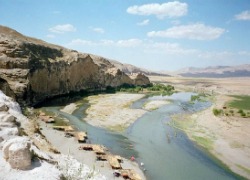Most conversations about Syria and Turkey currently revolve around the Syrian uprising, the regime’s repression of it, and a certain Turkish warplane shot down recently near the Syrian-Turkish border. However, a pre-existing, lower-level dispute between the two countries regarding the waters of the Euphrates river existed long before the uprising began, and will certainly continue afterwards, undoubtedly complicated by the events unfolding now.

The Euphrates rises in the mountains of southern Turkey, flows through Syria and Iraq, and then into the Persian Gulf. Estimates of the Euphrates’ flow generated within Turkey range from 88% to 98%, although they are very out of date.[1. Beschorner, N., “Water and Instability in the Middle East,” Adelphi Papers: 273, London: International Institute for Strategic Studies, 1992, p. 29. See also: Naff, T. and R. Matson (eds.), Water in the Middle East: Conflict or Cooperation, Boulder: Westview Press, 1984, p. 84.] The issue of water resource management has become securitized in the Middle East and water-related data has become politically sensitive; thus, figures are disputed and not independently verifiable to a satisfactory extent. All three riparians have implemented various projects along the river for flood control, irrigation, and hydroelectricity, the most ambitious of which is Turkey’s GAP, or South-eastern Anatolia Project. Again, estimates vary, but by 2025 per capita water withdrawals in Syria and Iraq are expected to be 16% and 27%, respectively, of their 1990 levels due to population growth and decreased river flows.[2. Elhance, A. P., Hydro-Politics in the 3rd World: Conflict and Cooperation in International River Basins, Washington DC: United States Institute of Peace, 1999, p. 134.]
The ‘negotiation’ process between the three riparians to reach an agreement over the use of the Euphrates waters has been drawn-out, sporadic, and largely unsuccessful. Bilateral and trilateral talks began to take place every several years starting in 1965, were briefly derailed in 1975 by a ‘flashpoint’ over low flows, and stopped in 1993 when the escalation of tensions between Turkey and Syria over the PKK (Parti Karkerani Kurdistan) issue made talks over water unfeasible.[3. See Daoudy, M., “Asymmetric Power: Negotiating Water in the Euphrates and Tigris,” International Negotiation, 14, 2009, p. 359- 389, and Kut, G., “Burning Waters: The Hydropolitics of the Euphrates and Tigris,” New Perspectives on Turkey, 9, 1993, p.1-17. ] The closest thing to an allocation treaty among the riparians is actually two different bilateral agreements, one between Turkey and Syria in 1987 and another between Syria and Iraq in 1990. Due to the lack of both accurate monitoring and international access to water-related data, it is unclear to what extent either of these agreements are being upheld. However, the period from the year 2000 until very recently showed signals of mutual rapprochement between Syria and Turkey over water issues and tripartite cooperation at the scholarly and technical level.[4. See Kibaroglu, A., “The Role of Epistemic Communities in Offering New Cooperation Frameworks in the Euphrates- Tigris Rivers System,” Journal of International Affairs, 61(2), 2008.]
The situation has continued unresolved for several decades now, and despite predictions of ‘water wars’ it appears that the stalemate of incomplete cooperation and muted conflict is fairly stable thanks to Turkey’s superior riparian position and military and political strength.[5. See Zeitoun, M. and J. Warner, “Hydro-hegemony – A framework for the analysis of trans-boundary water conflicts,” Water Policy, 8, 2006, 435- 460.] Additionally, the International Law of Trans-boundary Water Resources is not sufficiently developed to provide a clear solution, perpetuating a situation in which each riparian believes they occupy the international legal high-ground. The 1997 UN Convention on the Law of Non-Navigational Uses of International Watercourses provides a relatively weak institutional context for tackling the issue of allocation in situations of increasing scarcity. It espouses the principle of ‘equitable and reasonable utilization’ and outlines factors for determining said utilization that include: the contribution of water by each basin state, past utilization, existing utilization, economic and social needs, and an overall obligation not to cause significant harm. Yet, it fails to provide a framework for determining which of those factors takes priority in a situation of scarcity. In addition, there is doubt as to what extent the convention actually codifies existing international law. While it passed with a vote in the General Assembly of 103-3 with 26 abstentions, the negative comments of states who eventually voted for it, and the slow pace of ratification indicate its questionable effect as a statement of customary international law.[6. See Schwabach, A., “The United Nations Convention on the Law of Non-navigational Uses of International Watercourses, Customary International Law, and the Interests of Developing Upper Riparians,” Texas International Law Journal, 33, 1998, 257-279.]
In an age of increasing water scarcity, political and hydrological research in international river basins, along with the progressive development of international watercourse law, must be a priority for international organizations, academics, and policymakers. Otherwise, outcomes range from the occurrence of ‘water wars’ to continued disharmony and severe shortages for populations along the course of the dwindling rivers.
Joely Denkinger is a recent graduate of the University of St. Andrews, Scotland. She graduated with an M.A. Joint Honours in Arabic and International Relations after spending one of her semesters at the University of Damascus, Syria, and writing a dissertation entitled, “Hydro-politics in the Euphrates River Basin: Perspective, International Law, and Negotiation Theory.” Her academic interests include Water Law, International Law, and Arabic language and culture.


